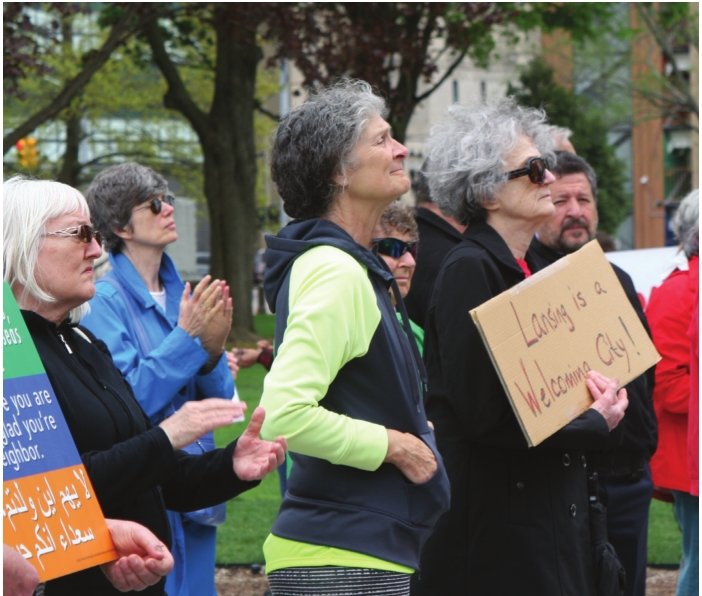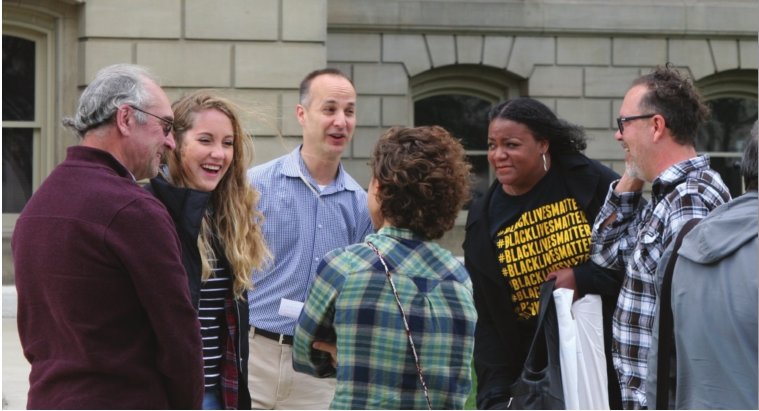
Sanctuary city debate charges up ‘Day Without Immigrants’ rally at Capitol
Lansing’s see-sawing sanctuary city status was a hot topic at a rally Monday afternoon on the state Capitol lawn protesting Trump administration policies that stir fear among immigrants and refugees.
The Lansing rally was one of seven across the state, and about 200 across the country, urging Americans to imagine a day without the contributions of immigrants and refugees.
Monday’s speakers wove an urgent new thread — freedom from fear — into familiar Mayday exhortations for fair labor practices and conditions, especially for migrant workers.
Vincent Delgado, co-founder of Lansing’s Refugee Development Center and briefly a member of the Lansing City Council, sarcastically called the Council’s decision to reverse a sanctuary city resolution a “clarifying story.” After voting 6-0 April 3 to name Lansing a sanctuary city, the Council rescinded the resolution April 12.
“We know the majority of the Council is afraid,” Delgado declared. “Now we know that the price of fear is $5.6 million,” he added, referring to Trump’s executive order to pull funds from cities that do not cooperate with federal immigration agents.
“We now know the value of a human being,” Delgado said. “I thought we decided a long time ago that people weren’t supposed to be bought and sold.”
Responding to Delgado’s criticism, Councilwoman Kathie Dunbar told the crowd the Council’s reversal did not make a difference in city policy.
“No matter what they call us, the policies are in place,” she said. “I’m really proud of our mayor. He took the initiative to do this when council wouldn’t.”
Mayor Virg Bernero issued an executive order April 3 consistent with policies of other sanctuary cities that limit local cooperation with federal immigration agents unless criminal action is involved.
“It doesn’t matter that my colleagues lost their backbone,” Dunbar said. “It doesn’t matter if somebody removed their spine before coming to Council that night. We are a sanctuary city.”
But after speaking Monday, Delgado said that avoiding the word “sanctuary” unnecessarily shows fear. With fear spreading among the immigrant community, he said, the word carries a heavy symbolic weight.
“Using the word doesn’t put us in any more harm,” he said, acknowledging that Trump’s executive order targets sanctuary “policies,” however they are labeled.
“But I’m beyond the practical matter,” Delgado said. “If we’re afraid to declare ourselves a sanctuary, a beacon of hope in a very dark place right now, what does that say about us?” Rodd Monts, field director for the Michigan ACLU, offered a more circumspect perspective on sanctuary cities in his remarks before the crowd.
“We don’t use the word ‘sanctuary’ because of the politically charged rhetoric that tends to come with it,” Monts said. “We are not suggesting anybody disobey the law. What we are suggesting is that you affirm publicly the protection from harassment and unlawful detention of anybody in your community.”
Dunbar told the crowd that even though the legal wrangle over sanctuary cities is not over, she thinks Lansing’s policy will be vindicated in the courts. She cited a partial, temporary block on Trump’s executive order punishing sanctuary cities issued by a California judge on April 25.
“We crafted a policy that was sound, that was legally defensible, that is enforceable,” Dunbar said. “When that judicial ruling came down from out West, it was everything we knew it would be. That damn [Trump] order is so overbroad, so ridiculous, so unenforceable there was no way it could stand.”
The ACLU’s Monts told the crowd he’s worked more in immigration issues in the past four months than he has in the previous six years.
He cited a case of a Latina middle school student subjected to lunchroom taunts of “build the wall” shortly after the November 2016 election.
A few minutes later, Monts’ story repeated itself in front of the Capitol steps.
While Angela Waters Austin of Black Lives Matter Lansing spoke at the podium, a man walking into the Capitol through a doorway below her yelled out, “Build the wall!” Without skipping a beat, Austin inserted an impromptu response into her remarks. “People who say ‘Build a wall’ reveal what is in their hearts,” she said, glancing sideways.
Austin told the crowd that Black Lives Matter activists need to speak out against policies that threaten immigrants and refugees.
“The propaganda leads us to believe that our issues are separate, that we are not in this fight together,” she said. “I say that if one of us is unsafe, we are all unsafe.”
She urged the crowd to pressure elected officials to help 50,000 Haitians and 4,000 Somalis whose temporary protected status is due to expire May 23. The Haitians were allowed to live and work in the U.S. after a catastrophic 2010 earthquake in Haiti, where conditions are still shaky because of subsequent hurricanes and political unrest.
Elva Reyes, a trustee of the Lansing chapter of Labor Council for Latin American Advancement, was one of several speakers who called for comprehensive immigration reform instead of mass deportation and other drastic measures contemplated by the Trump administration.
“They’re trying to buy us off with phony promises of jobs building a wall we don’t need,” Reyes said.
State Rep. Andy Schor, a candidate for Lansing mayor, praised one of his colleagues, Rep. Abdullah Hammoud of Dearborn, for introducing legislation in the state House to pursue “sensible and humane immigration policies” and “oppose discriminatory policies and practices in immigration enforcement.”
But Schor told the crowd that “elections have consequences.”
“[Hammoud’s bill] has gone nowhere, buried in committee,” he lamented. “We need to remind my colleagues, our legislators, of the importance of immigrants and the need to help our refugee population.”
The heavy lifting of imagining a day without immigrants was left to Edilberto Montemayor, a professor emeritus at MSU, co-founder of Michigan Latinx Info Cluster and co-organizer of Monday’s rally.
Montemayor told the group that out of an estimated 11 million undocumented immigrants, more than 60 percent have been in the U.S. for more than 10 years.
“They have become integral parts of our economy and our society,” he said. “We have all benefited from their hard work.” He told the crowd that undocumented immigrant work produces “cheap food, excellent restaurant and hotel services, cost-effective construction, top-notch health care” and cited a study predicting that mass deportations would cost the U.S. economy $5 trillion over 10 years.
He made the sobered crowd smile with a list of iconic products invented by immigrants.
“No Google, no Chevrolet, no blue jeans, no shopping malls,” he shouted. “No Velveeta and other Kraft products. No White House, no hamburgers, ketchup. No Budweiser. Come on, man! America would (be a boring place.”
He linked the day’s overriding theme of “freedom from fear” to traditional May Day demands for better pay and conditions for undocumented workers.
It’s disingenuous to call for a crackdown on immigration, he said, after the government has “conveniently looked the other way when people come in and work hard,” with employers as accomplices, for decades.
“They say, ‘You can stay in the U.S. as long as you remain in the shadows,’” he said. “Which means, as long as you work really hard for less than you deserve legally, and as long as you tolerate abusive treatment and substandard working conditions.”
Echoing Reyes and several other speakers, Montemayor urged the government to craft a humane and rational response to a problem it helped create.
“We are here to stay,” Montemayor said.
“We ain’t going anywhere.”
Support City Pulse - Donate Today!
Comments
No comments on this item Please log in to comment by clicking here